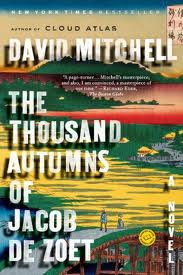
David Mitchell is famous as an author of literary fiction, so I was unsure what to expect of this novel, some six hundred pages set in 18th century Japan. I feared for lines like this:
Tea is cool lush green in a smooth pale bowl.
And indeed, there was quite a lot of this sort of thing, and, initially, a fair amount of lengthy and suddenly poetic speech-making from uneducated labourers/surly deck hands, as well as learned and unmotivated discourses on early medicine.
I had serious concerns, but I soldiered on, as the setting was interesting. Jacob de Zoet is among the very few Dutch who have managed to gain a toe-hold in Japan as traders, while the country is still resolutely insular, not allowing its citizens to leave the country, or foreigners to go further than a tiny section of the port. On page 100, I was still worried I was in for an elaborate metaphor on the birth of modern science; when all of a sudden, the novel took a bizarre and spectacular left turn. Skip the next paragraph if you plan to read the book.
Jacob falls in love with a heavily scarred Japanese woman, who is then abducted and forced into a CULT FOR BREEDING BABIES which are later MURDERED TO GIVE THIS CRAZY ABBOT ETERNAL LIFE. Safe to say, we have left the realm of the well-behaved literary novel. There is even a failed rescue attempt, with sword fighting, and face-to-face encounters with the deranged Abbot; and then, if this was not enough, we suddenly switch to a being on board an English ship preparing for battle. Apparently, Holland has fallen to the British, so the Dutch on Nagasaki are essentially stranded. There is a big sea battle, and Jacob more or less saves Nagasaki, single-handed, don’t ask me how, because I didn’t really follow. The book ends the traditional way, with a ritual disembowelling and a triple-cross poison plot.
So in short: literary potboiler. I loved it. There was lots of beautiful writing – try this:
An enterprising fly buzzes over his urine in the chamber pot
I can’t think when I’ve heard sewage more elegantly described.
There was also a staggering amount of research, and historical detail, woven neatly and elegantly into the deranged plot. I learnt, for example, that to get a gouty toe to heal, doctors of the time thought it a good idea to put mouse droppings in the open wound, to produce more pus. Thank god for the birth of modern science.
